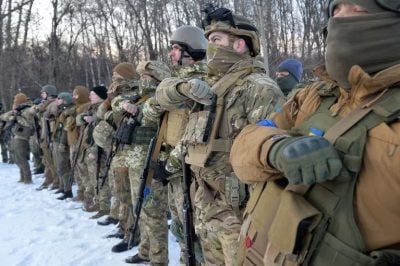Military and Political Crisis in Ukraine: Front Line at Great Risk of Collapse. Russia’s “Big Attack” in August? Odessa and Kharkov Risk of Falling? Will Peace Negotiations Be Revived?

All Global Research articles can be read in 51 languages by activating the Translate Website button below the author’s name (only available in desktop version).
To receive Global Research’s Daily Newsletter (selected articles), click here.
Click the share button above to email/forward this article to your friends and colleagues. Follow us on Instagram and Twitter and subscribe to our Telegram Channel. Feel free to repost and share widely Global Research articles.
Global Research Referral Drive: Our Readers Are Our Lifeline
***
Ukrainian President Volodymyr Zelensky signed a law on April 2 that eliminated the need for physical fitness to enter military service and reduced the minimum age for military conscription from 27 to 25 years old. These desperate measures aim to overcome the shortage of soldiers, but as high-ranking Ukrainian officers admitted to POLITICO, the military situation is bleak, especially as the summer approaches when Russia is expected to launch a major offensive.
“Zelensky signed a law on mobilisation from the age of 25. For 11 months, the draft law was voted on by the Parliament of Ukraine, but did not enter into force because it was not signed,” wrote Ukrainian deputy Oleksiy Goncharenko on social media, adding: “Zelensky signed a law eliminating the status of ‘physical fitness [for military service]’.”
According to Goncharenko, men declared partially fit for military service must undergo a second medical examination within nine months.
The Ukrainian president approved a law reducing the minimum age for military recruitment from 27 to 25 and established a virtual recruitment office through which summons for recruitment can be sent electronically. Ukraine has been under martial law since February 24, 2022. While the law is in effect, men between the ages of 18 and 60 are prohibited from leaving the country.
Shortages of soldiers at the front, caused mostly by injury and death in combat with Russian forces or, to a lesser extent, by surrender, has led Ukraine to intensify forced conscriptions, including of people with physical disabilities and women. A bill is also being discussed that aims to allow prisoners in Ukraine to obtain parole to reinforce the front line.
All this points to Ukraine’s desperate situation. In fact, according to POLITICO, citing high-ranking Ukrainian military officials who served under former General Valery Zaluzhny, Ukraine’s front will collapse if the Russian Army makes a concentrated attack in one place.
“The officers said there’s a great risk of the front lines collapsing wherever Russian generals decide to focus their offensive,” the article points out. “Moreover, thanks to a much greater weight in numbers and the guided aerial bombs that have been smashing Ukrainian positions for weeks now, Russia will likely be able to penetrate the front line and to crash it in some parts.”
One of the Ukrainian officials added that the West will no longer help Kiev deal with the Russian offensive.
“There’s nothing that can help Ukraine now because there are no serious technologies able to compensate Ukraine for the large mass of troops Russia is likely to hurl at us. We don’t have those technologies, and the West doesn’t have them as well in sufficient numbers,” one of the top-ranking military sources told POLITICO.
Another officer expressing concern said:
“We don’t only have a military crisis — we have a political one. While Ukraine shies away from a big draft, Russia is now gathering resources and will be ready to launch a big attack around August, and maybe sooner.”
Russian Defence Minister Sergei Shoigu, at a meeting with the leadership of the Russian Armed Forces, said on April 2 that since January, the Ukrainian military has suffered more than 80,000 casualties and lost more than 14,000 units of various equipment, including more than 1,200 tanks and other armoured vehicles. He also noted that the Ukrainians, after the failure of last year’s counteroffensive, are trying, unsuccessfully, to consolidate themselves in certain positions while the Russian military continues to push the Ukrainian Army to the west.
Zelensky recently warned the US that unless the stalled multibillion-dollar package for military equipment, including 155-millimetre artillery shells, Patriot air-defence systems and drones, is approved soon, the Ukrainian military will have to “go back, retreat, step by step, in small steps” and that some major cities could be at risk of falling, the most obvious being Odessa and Kharkov.
“But the sad truth is that even if the package is approved by the US Congress, a massive resupply may not be enough to prevent a major battlefield upset,” POLITICO lamented. “And such a setback, especially in the middle of election campaigns in America and Europe, could very well revive Western pressure for negotiations that would obviously favour Russia.”
In the current conflict, it is impossible to resupply Ukraine effectively as Russian industry has steamrolled the West to embarrassing proportions, all whilst the Ukrainian military continues to fight using mostly unmotivated conscripts since the professional soldiers are mostly dead or wounded. By Zelensky lowering the conscription age and the need for physical fitness, he once again demonstrates that Ukraine is in a position where victory is impossible, posing the question of why he continues a war that will only result in the loss of more territory and dead Ukrainians.
*
Note to readers: Please click the share button above. Follow us on Instagram and Twitter and subscribe to our Telegram Channel. Feel free to repost and share widely Global Research articles.
Ahmed Adel is a Cairo-based geopolitics and political economy researcher. He is a regular contributor to Global Research.
Featured image source

